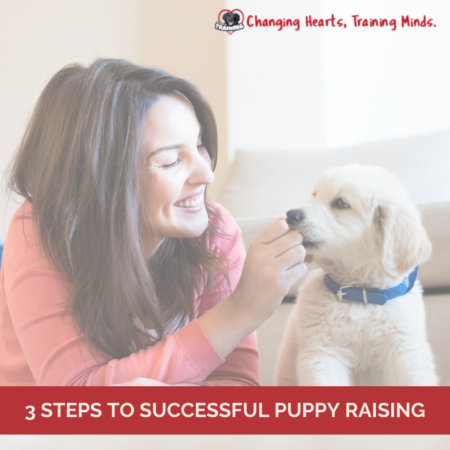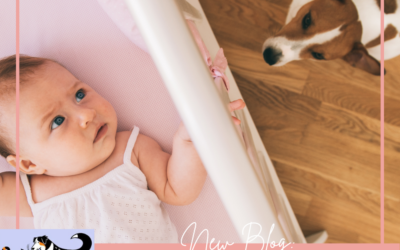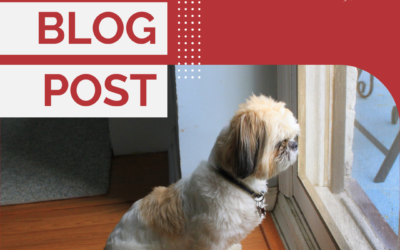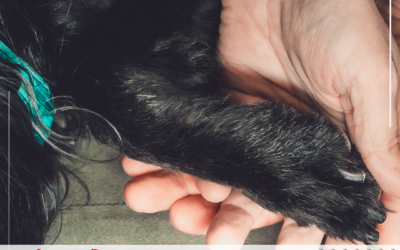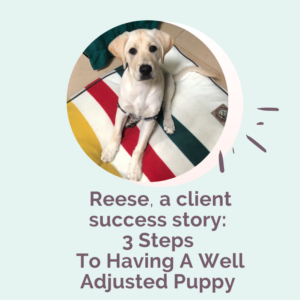 Puppies are hard work. They’re usually harder than people anticipate and that’s assuming you have a well-bred, generally problem free puppy. I’ve had puppy clients with severe fear issues and I’ve had puppy clients with medical issues like UTIs and bladder infections. As if potty training a puppy isn’t hard enough, add that in, and anyone would be ready to throw in the towel.
Puppies are hard work. They’re usually harder than people anticipate and that’s assuming you have a well-bred, generally problem free puppy. I’ve had puppy clients with severe fear issues and I’ve had puppy clients with medical issues like UTIs and bladder infections. As if potty training a puppy isn’t hard enough, add that in, and anyone would be ready to throw in the towel.
So how can you best prepare and set yourself and your cutie puppy up for success? I have three steps for you and I’m going to share a client success story about Reese to illustrate my points.
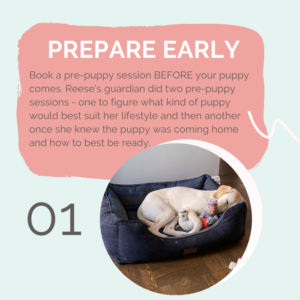 Step 1: Prepare Early. There’s a lot that goes into this step. I strongly encourage you to book a pre-puppy session BEFORE your puppy selection happens. Reese’s guardian did two pre-puppy sessions – one to figure what kind of puppy would best suit her lifestyle and then another once she knew the puppy was coming home and how to best be ready. Doing a session before the puppy has even been selected is really critical here. If you choose the wrong breed, wrong rescue or shelter, wrong coat type, wrong energy level or the wrong temperament, no matter how much good training you do, this puppy may not be a good fit for your lifestyle and family. You shouldn’t pick a puppy just because they’re cute anymore than you’d pick a life partner because you find them attractive. Puppies grow into angsty teenagers and if you’re lucky, senior dogs who likely will get cranky from sore joints, have aging health issues and lose their activity level. Cute puppies don’t stay cute puppies forever which is why things like temperament, activity level, size, grooming requirements, predisposed health issues and more all need to be considered. I can help you navigate those things and help guide you on the right path – almost like a puppy matchmaker.
Step 1: Prepare Early. There’s a lot that goes into this step. I strongly encourage you to book a pre-puppy session BEFORE your puppy selection happens. Reese’s guardian did two pre-puppy sessions – one to figure what kind of puppy would best suit her lifestyle and then another once she knew the puppy was coming home and how to best be ready. Doing a session before the puppy has even been selected is really critical here. If you choose the wrong breed, wrong rescue or shelter, wrong coat type, wrong energy level or the wrong temperament, no matter how much good training you do, this puppy may not be a good fit for your lifestyle and family. You shouldn’t pick a puppy just because they’re cute anymore than you’d pick a life partner because you find them attractive. Puppies grow into angsty teenagers and if you’re lucky, senior dogs who likely will get cranky from sore joints, have aging health issues and lose their activity level. Cute puppies don’t stay cute puppies forever which is why things like temperament, activity level, size, grooming requirements, predisposed health issues and more all need to be considered. I can help you navigate those things and help guide you on the right path – almost like a puppy matchmaker.
Once you know your puppy will be coming home, then we can do another session to discuss what items you need to purchase, how to puppy proof, what to expect in terms of housetraining, chew training and more. The better prepared you are for the realities of puppy raising, the more likely you are to be good at it.
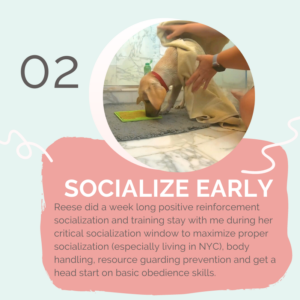
Step 2: Socialize Early. Puppies have a finite window of time for early socialization. This critical developmental period ends around 12 weeks of age so it’s important to not squander those precious days and weeks. Reese did a week long socialization and training stay with me during this important time in her life to ensure she was properly socialized and prepared for her life in NYC. We also go a little head start on some basic obedience skills but it’s important to note that sit can be taught at any age. It’s much more important to prioritize socialization over obedience under 12 weeks of age. And remember, Yes, Your Puppy CAN Go Out Before All Their Vaccines. You just need to be safe and smart about it.
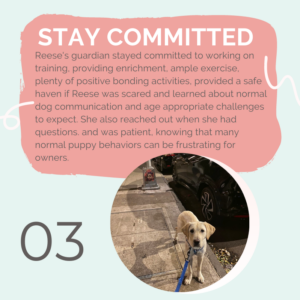
Step 3: Stay Committed. Understanding the training is a lifelong process, not just a 6 week puppy class or one week stay and train. Learning never stops and while those early learning experiences are important, skills learned during that time needs to continue to be reinforced and practiced. People make the mistake of thinking of training as one and done, like “well, we did that 6 week class…I guess our dog is trained now!” and they check it off their to do list. Dogs aren’t robots or computers that we program and then that’s it. Successful training requires a long term commitment and understanding that your dog will have different needs at different times in their life.
Your cute little puppy will turn into an angsty, mouthy teenager in a few months and you need to be prepared for that and know how to handle it without anger or frustration. Having a plan to provide ongoing enrichment, ample exercise, bonding activities and being a safe haven to ensure they aren’t put into scary situations they’re not prepared for, are all things that are key to having a well-adjusted puppy grow into a lovely adult dog.
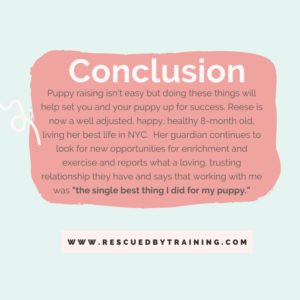
Puppy raising isn’t for the faint of heart, or those who like their sleep. But puppyhood is temporary and once you get over the struggles of house training, chew training and get into a good routine, you will find all your hard work has paid off. Reese is now a well adjusted, happy, healthy 8-month old, living her best life in NYC. Her guardian continues to look for new opportunities for enrichment and exercise and reports what a loving, trusting relationship they have and says that working with me was “the single best thing I did for my puppy.”
Are you ready to set yourself up for a happy, well-adjusted puppy? Book today! Contact me if you need help or are thinking about adding to your family!
And, be sure to sign up for my free weekly newsletter so you don’t miss out on free tips, videos, personal stories, client successes and more!
Happy training!
![]()

